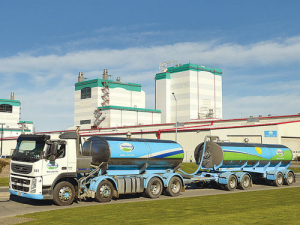Battle for milk
OPINION: Fonterra may be on the verge of selling its consumer business in New Zealand, but the co-operative is not keen on giving any ground to its competitors in the country.
 Fonterra says it shouldn’t be forced to collect milk from farms with poor environmental credentials.
Fonterra says it shouldn’t be forced to collect milk from farms with poor environmental credentials.
Fonterra says it shouldn’t be forced to collect milk from farms with poor environmental credentials.
Fonterra chairman John Wilson says a lot has changed since the Dairy Industry Restructuring Act (DIRA) was enacted to launch the co-op in 2001.
“Today’s environment is so different,” he told a Northland Dairy Development Trust conference in Whangarei this month.
“Right now we are required to pick up milk from any farmer who is thinking about supplying milk.... If that farmer does not have great environmentl practices or is in an area that’s not great for dairying or has a highly fragile ecosystem, we are still forced to pick up that milk,” Wilson says.
“That’s not the right answer so regulations need to be changed to address that…. Unfortunately they were not changed by the previous government and we hope we can have a constructive conversation with the current government.”
The Labour-led coalition government has signalled a comprehensive review of DIRA.
It is also introducing a bill to prevent the expiry of the efficiency and contestability provisions of the DIRA in the South Island. This will mean the current regulatory regime will continue in place; it is due to expire on May 31 this year.
It includes the open entry-and-exit clause under which Fonterra must accept any application to become a shareholding farmer in the co-op, and accept supply of milk from that shareholder. Shareholding farmers can also readily exit from Fonterra and supply another dairy processor should they wish to do so.
Fonterra also has to sell up to 20% of its milk to other processors each season.
DIRA was set up to manage Fonterra’s dominant position in the NZ dairy market, until sufficient competition emerged. It contains automatic expiry provisions that were triggered in 2015 in response to the co-op’s reduced market share in the South Island.
More milk available
Fonterra says rival processors will need a competitive offering to catch milk from its suppliers.
Chairman John Wilson says farmers have seen processors come and go over time.
“We went through a period of five years until two years ago when our milk production grew at 5% average per annum.
“That’s a lot of milk growth; there has been a lot of milk available so other processors have been taking a slice of a growing pie. We strongly believe that environment has changed.”
Could a breakthrough in fermentation create a new multi-million-dollar export market for shiitake mushroom extracts into China?
Meadow Fresh has created the world's first fantasy sports league powered by real cows.
This year, 'Foodie February' sees potatoes take the spotlight as one of New Zealand's most powerful and versatile food heroes.
A multi-cultural team is helping to establish one of New Zealand's largest plantings of premium eating grapes - while learning each other's languages and cultures along the way.
The World Wide Sires National All Day Breeds Best Youth Camp Best All Rounder plaudit has become family affair, with 2026 Paramount Cup winner Holly Williams following in her sister Zara's footsteps.
DairyNZ is giving New Zealand farmers a unique opportunity to gain hands-on governance and leadership experience within the dairy sector.